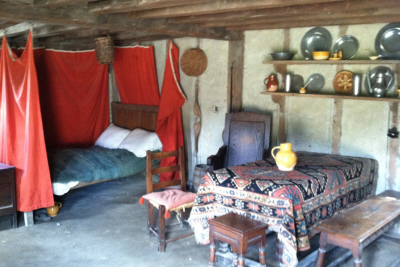
When America Tried Socialism
In 1620, English settlers began an experiment with one of the most attractive and bewitching economic concepts known to society: public ownership. Today we know these settlers as ‘the pilgrims’ who founded Plymouth Colony, but at the time, they were simply struggling for survival.
I had the opportunity to visit Plymouth in September 2014. The recreated colony is charming, filled with quaint wooden huts and realistic historical interpreters. The ‘pilgrims’ go about their work merrily, fixing fences, planting crops, and stirring stew in the large pots that hang over the fire.
It’s an idealistic view of the colony, because for years, Plymouth was on the verge of extinction. Not only were they on the brink of famine, but half died within a year of arriving in America. While we think of the pilgrims as hard-working and honest folk, their own governor admitted that “much was stolen both by night and day, before it became scarce eatable.”

Field of Corn at Plymouth Colony
Wandering through recreated Plymouth, you would never imagine the difficulties that the earliest settlers experienced. The fields of corn waving in the wind, the large piles of firewood outside the houses, and the neatly thatched roofs all give the idea of a transplanted English village.
Their idea of economics was simple: each person contributed to the ‘common pot’ as much as possible, and took from it only what was needed. It seemed like a wonderful plan, but it never addressed thievery or laziness. Governor Bradford, the pilgrim leader, wrote that the young men – who were able to do the most work – disliked that they were supporting “other men’s wives and children.” Instead of working hard to see other people profit, they preferred to work as little as possible, and gain from the work of others.
We’ve all enjoyed the stuffed Turkey, the cranberry sauce, and the pumpkin pie at Thanksgiving. You have probably experienced that wonderful, satiated feeling after the feast, perhaps too full to eat another bite. But for the pilgrims, thanksgiving was only a temporary bright spot in the midst of famine. It continued on for several more years.

Inside a Cabin at Plymouth Colony
The situation finally turned around when Governor Bradford abolished the primitive form of socialism. He divided the land between the settlers. From now on, every family could keep their extra corn, or trade it for whatever they wanted. For the first time in the history of the colony, famine was gone. The settlers thrived. Now there was a motivation and incentive for work.
A similar situation also occurred in the English settlement at Jamestown. There, primitive socialism kept the settlers enslaved in a cycle of famine and poverty. The situation only changed when their leader, John Smith, applied a simple principle – “he that will not work, shall not eat” – a common-sense idea that comes straight from the pages of the Bible.
(It’s fascinating that when I visited Jamestown, the tour and historical center never mentioned this pivotal point in the colony’s history. They never described the rejection of socialism that saved the colony. It almost seems as if the story isn’t politically correct enough to make it into ‘official’ history!)
Why is the story of Plymouth important for today? Not only does it reveal that socialism is a miserable policy, but it also simplifies the modern situation. Let me explain. Economics today are frightfully complex. How can one simplify the trade deals, the credit rankings, the inflation rate, the role of the federal bank, the investments of major businesses, and so many other issues that affect a modern economy? In Plymouth, those complexities are removed.
For example, many today point to the Scandinavian countries as models of socialist utopia. They forget that the complexities (like trade deals, investments, and national banks) are distorting the picture. When all of those intricacies are removed, the Scandinavian nations are in the same place as the Plymouth colony – and economic analysts note that the socialist policies of Scandinavia are only short-term solutions. They are not sustainable. Sooner or later, those countries will fall apart. If a modern-day Governor Bradford does not step forward to offer clear, common-sense guidance, every socialist country will end where Plymouth began.
So don’t think that America has never tried socialism. She began as a socialist settlement. And thankfully, she hasn’t continued that way.




Good article. You make a good point.
Apri showers bring the flowers that bloom in May. What does the Mayflower bring?
The Pilgrims
I was thinking about this when I was reading a time magazine article about the complexities of economic globalization and another one about how people should supposedly get ready for retirement. It gets overwhelming and convoluted. Furthermore, it all changes every few years!